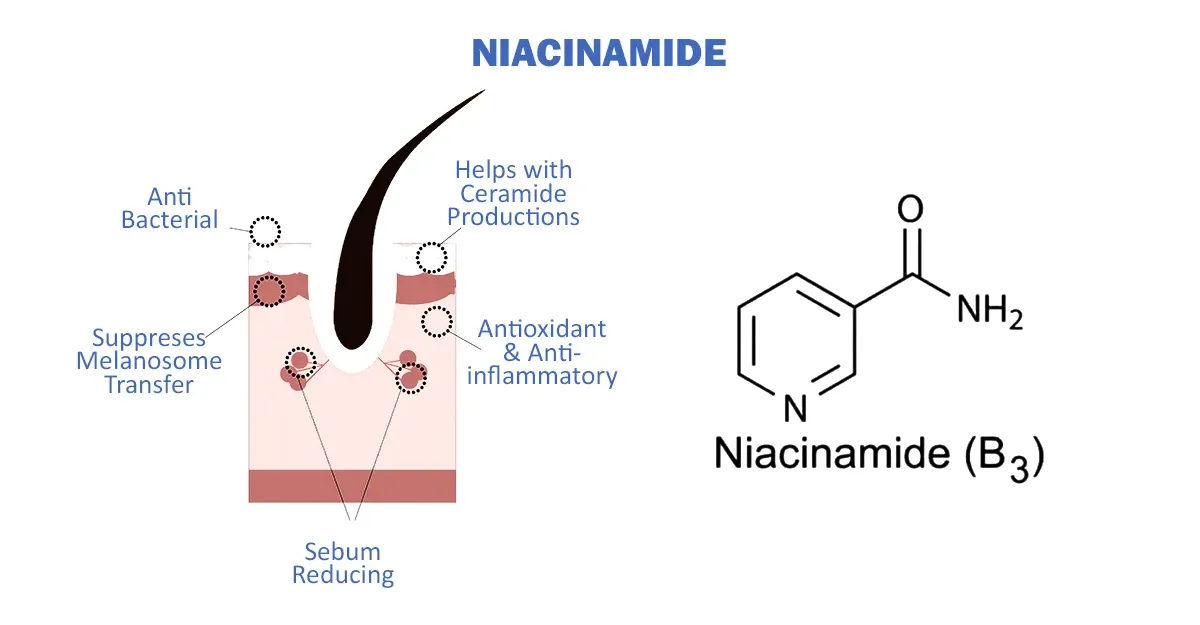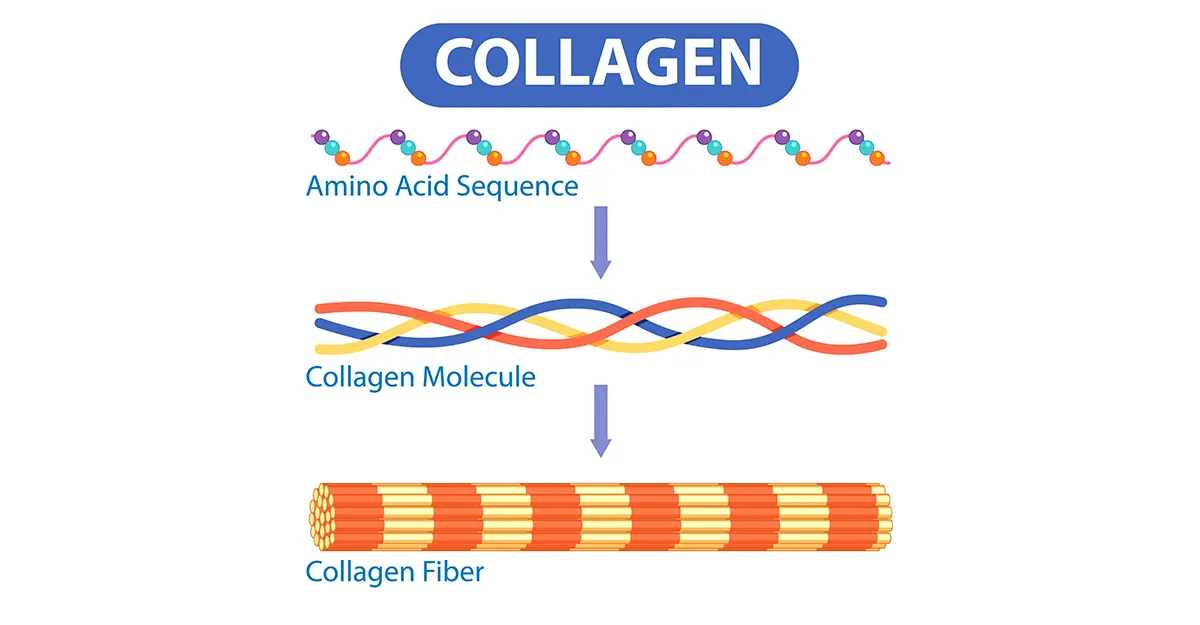Your cart is currently empty!

Not too long ago, a patient came to me quite confused about collagen and niacin. She’d been reading articles online, many of which were conflicting, and wanted to know if collagen and niacinamide products actually made a difference or if they were just another cosmetics fad. Her concerns are pretty common among my patients.
Niacinamide and collagen have earned their spot as two powerhouse ingredients in skincare products. Whether it’s a patient in her early twenties looking for ways to manage oily skin or someone in her fifties aiming to restore firmness and reduce fine lines, I often find myself recommending these ingredients for their versatility and long-term benefits.
I’ll break down everything you need to know about niacinamide and collagen, how they benefit your skin individually, and why they work so beautifully together. Plus, I’ll address some of the most common questions I get about these ingredients, so you can feel confident about adding them to your skincare routine.
Table of Contents
Niacinamide

Niacinamide, which you probably know better as vitamin B3, is a water-soluble vitamin with a range of benefits that’s almost like a Swiss army knife for skin care. It is used in formulations for everything from cleansers to serums, and there’s a reason it’s so popular, it is compatible with almost all skin types and doesn’t come with the stinging or irritation that some other active ingredients cause.
One of my patients here in Dubai, a young professional in her late 20s, came to me recently with complaints of persistent redness and uneven skin tone. Her work schedule left her stressed and tired, which was showing up on her skin. I suggested she incorporate niacinamide into her skincare routine, explaining how it can strengthen the skin barrier, reduce redness, and even out skin tone without causing irritation. Some of niacinamide’s most valuable benefits include:
- Strengthening the Skin Barrier
Niacinamide helps build proteins in the skin and locks in moisture, effectively supporting the skin’s protective layer. This is especially beneficial in harsh climates—like Dubai’s sun and heat—where skin can quickly become dehydrated and stressed. - Reducing Hyperpigmentation
Many patients struggle with dark spots and uneven skin tone, often caused by prolonged sun exposure or post-inflammatory hyperpigmentation. Niacinamide can inhibit melanin production, making it an excellent choice for those looking to brighten their complexion naturally. - Regulating Sebum Production
For those with oily skin or acne-prone skin, niacinamide is a game-changer. It helps balance oil production, reducing the chances of clogged pores and breakouts. - Anti-Aging Properties
This ingredient doesn’t just stop at hydration and oil control; it’s also effective in reducing fine lines and wrinkles by supporting the production of collagen and elastin in the skin.
Incorporating niacinamide into your routine doesn’t have to be complicated. Just a few drops of a good niacinamide serum after cleansing and toning can make a big difference over time. For more detailed information, this Healthline article on niacinamide provides some great insights.
Collagen

While niacinamide is great for barrier repair and oil control, collagen focuses on supporting the skin’s structure. Collagen is the most abundant protein in the body, naturally responsible for giving skin its firmness and elasticity. As we age, however, our bodies produce less collagen, leading to sagging, fine lines, and wrinkles.
Several months ago, a patient in her forties came to me, concerned about the loss of elasticity in her cheeks and jawline. She wanted to know if topical collagen would actually make a difference. It’s a common question I get, and the answer isn’t always straightforward. While collagen molecules are typically too large to penetrate the skin deeply, topical applications that stimulate collagen synthesis—like certain peptides and vitamin C—can still offer visible results. Key benefits of collagen in skincare include:
- Improving Skin Elasticity
Collagen helps the skin maintain its firmness and resilience. Supporting collagen synthesis can help keep your skin looking youthful and lifted, making it an essential component in any anti-aging regimen. - Hydration and Moisture Retention
Collagen molecules attract and retain moisture, helping your skin stay hydrated. This is especially helpful in dry climates where maintaining moisture can be a constant challenge. - Wound Healing and Skin Repair
Collagen isn’t only about anti-aging; it’s also essential for skin repair. Collagen supports the healing process, which is why you’ll often find it in post-procedure or sensitive skin formulations.
Combining Niacinamide and Collagen for Optimal Results
Many patients are often pleasantly surprised to learn that niacinamide and collagen can be used together, enhancing each other’s benefits without causing irritation. Here’s how this duo works harmoniously for your skin:
- Enhanced Barrier Protection
Niacinamide strengthens the skin barrier, helping it retain the moisture and benefits provided by collagen. Together, they create a strong foundation for plump, hydrated skin. - Boosting Collagen Synthesis
Niacinamide supports collagen production indirectly by protecting the skin from oxidative stress and inflammation. This allows your skin’s natural collagen stores to stay intact and work longer. - Anti-Aging Synergy
While collagen addresses the deeper structural elements of the skin, niacinamide works on the surface to improve texture and tone. Together, they create a more youthful, glowing complexion. - Reduced Inflammation and Redness
Niacinamide is excellent for calming redness and inflammation, which creates a better environment for collagen to work its magic on skin repair and rejuvenation.
How to Use Niacinamide and Collagen in Your Routine
If you’re ready to incorporate these two ingredients into your daily routine, here’s a simple step-by-step guide:
- Start with Niacinamide
After cleansing, apply a few drops of niacinamide serum, giving it time to absorb before layering other products. This way, niacinamide can prep the skin for other ingredients. - Follow with Collagen
Apply a collagen-based cream or serum as the next step. Collagen works particularly well as part of your evening routine when your skin is in repair mode. - Don’t Forget Sunscreen
UV exposure breaks down collagen fibers and can lead to premature aging. I tell all my patients, regardless of age or skin type, that daily sunscreen is non-negotiable, especially in sunny climates. - Use Consistently
Skincare isn’t a one-and-done process. Consistent, long-term use of niacinamide and collagen products will yield the best results. For added hydration, try a product like my Kudzu-based face cream which I’ve formulated to be suitable for all skin types.
Niacinamide and Collagen FAQ
Q: Can I use niacinamide and collagen if I have sensitive skin?
Yes, both niacinamide and collagen are generally well-tolerated, even for sensitive skin types. If you’re concerned about irritation, start by using a low concentration of niacinamide (around 5%) and apply collagen products in the evening.
Q: Will applying collagen topically really work?
While collagen molecules can’t penetrate the skin deeply, they do provide surface hydration and can support the skin’s natural moisture barrier. For collagen production, combining collagen-stimulating ingredients like niacinamide, peptides, and antioxidants can yield better results.
Q: How soon will I see results from using niacinamide and collagen?
Consistency is key! Most people start to notice improvements in skin texture and hydration within 4 to 6 weeks. Anti-aging effects, such as reduced fine lines, can take longer to become visible, typically around three months of regular use.
Q: Can I use niacinamide and collagen alongside other active ingredients like retinol?
Yes, niacinamide is versatile and works well with other ingredients, including retinol and hyaluronic acid. I often recommend it as a calming agent to counteract retinol irritation. Collagen can also be paired with these ingredients without issue.
Q: Are there any lifestyle changes that can help improve collagen levels?
Diet and lifestyle play a huge role in collagen production. Consuming foods rich in vitamin C, zinc, and protein supports natural collagen synthesis. Minimising sun exposure, not smoking, and getting enough sleep can also help maintain collagen levels over time.
Final Thoughts and Recommendations
Niacinamide and collagen are two versatile ingredients that offer a comprehensive approach to skincare. Together, they provide both immediate and long-term benefits, from improving hydration and texture to promoting a more youthful, resilient skin barrier. Incorporating these ingredients into a consistent skincare routine can make a noticeable difference, especially if combined with lifestyle choices that support skin health.
For those looking to explore ingredient-based skincare in further detail, I highly recommend my in-depth guide on reducing wrinkles with Kudzu, a powerful plant extract for skin elasticity and texture. You can also explore my ultimate guide to Kudzu for hair and skin care, which highlights Kudzu’s benefits for both skin and hair.
If you have specific concerns or want to explore a personalised skincare plan, I offer teleconsultations where we can go over your skin’s needs and goals. You’re welcome to reach out through my website for a consultation, especially if you’re unsure about where to start or need guidance on integrating these ingredients.
More from the blog
- 5 Powerful Menopause Skincare Secrets Revealed
- 5 Powerful Ways to Stop Teen Hair Fall
- 5 Vital Shopping Tips for Skincare Products
- 5 Effective Solutions for Neck Pigmentation
- 5 Effective Ways to Stop Excessive Sweating (Hyperhidrosis)
Recommended Topics
Popular Tags
40s aging hair care biotin choosing right cobalamin collagen dry itchy skin excessive sweating excess vitamin hair care hair care in 40s hair fall hair health hair loss treatment hydroquinone hyperhidrosis menopause menopause skincare menopause skin care minoxidil neck darkening neck pigmentation perimenopause scalp allergy scalp allergy treatment scalp health shampoo shampooing side effects skin care skincare skincare products skin health sunscreen supplement safety sweating problem teen hairfall teen hair thinning too much sweat tretinoin vitamin b12 vitamin d vitamin overdose washing hair wrinkles












Leave a Reply